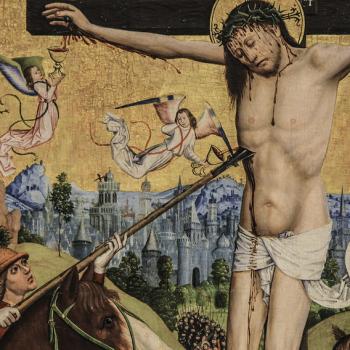Being a Missourian, I guess I need to talk about this.
Patheos's Friendly Atheist already discussed what this proposed amendment to my state's constitution could mean. For the most part, the Missouri Public Prayer Amendment is strictly showboating. Much of the new language simply codifies precedent. (Read the current text of Section 5, Article I, here.) Here's what the new language seems to say, in short:
- The state cannot establish an official religion or coerce anyone to participate in religious activity.
- Everyone has the right to express their religious beliefs, either personally or in a group, as long as it doesn't disturb the peace and abides by the rules placed on any kind of free speech. (Yes, I know—"if it has rules, how is it free?") This includes elected officials, state employees, and students.
- The legislature may invite clergy to offer invocations at sessions of the General Assembly.
- Students are free to express their religion in school assignments and cannot be discriminated against on the basis of religious content in their work. No student can be compelled to participate in assignments that violate their beliefs.
- To make sure we remember this, all schools have to display the Bill of Rights of the U.S. Constitution.
- None of this expands the rights of prisoners.
I should add that the standard Internet boilerplate applies: I am not a lawyer, so my summary of the bill may miss some subtleties. I suggest you read it yourself at the link above. It's short. On the other hand, the summary—the thing on the ballot—misses all of the subtleties.
Most of the new language doesn't actually change how things are handled in my home state. It even maintains some painful language from the current text. Despite updating the language of Section 5 to be more gender-equitable (all references to "men" have been changed to "men and women), the new version would retain the archaic and presumptively monotheist language currently present. "All men and women have a natural and indefeasible right to worship Almighty God according to the dictates of their own consciences," the bill's new wording says. Thus, it maintains that freedom of religion is just in the service of a singular, presumably Christian deity. It even throws in an extra reference to "Almighty God" that wasn't there before.
Whatever ... none of that changes the material circumstance of religious freedom in Missouri. To my mind, the bits about students and prisoners matter the most. (Paul Fidalgo at Friendly Atheist mentions his dislike of enshrining the right of the General Assembly to invoke prayers before meetings. I don't like it either, but it's already in practice, so it doesn't change anything.)
I don't know how far the new provisions would go if taken to court. Taken at face value, it appears that Missouri students could simply ignore large parts of their education under this bill. The wording—"no student shall be compelled to perform or participate in academic assignments or educational presentations that violate his or her religious beliefs"—seems to give an incredible amount of latitude. Not only can a (say) fundamentalist Christian student disagree with the material presented in the class—his or her right, of course—but, as I understand it, they could not be compelled to participate in the class session at all. The Friendly Atheist keys in on biology classes—where I'm sure most of our minds go immediately. But the humanities are also full of material that could set these triggers off. For instance, teaching The Merchant of Venice becomes problematic under this law.
In essence, it seems like this language could invalidate any hope of standards or accountability in education—much less hope that education will foster maturity or intellectual curiosity. We could simply opt-out of anything that challenges our previously-held beliefs. And, perhaps more to the point, we could be compelled to opt-out because our studies conflict with our parents' beliefs, regardless of our own. I can see this clause being truly devastating to the intellectual development of Missouri students. It sounds miserable.
Then there's that bit about prisoners. The bill notes that the protections it guarantees don't expand the rights of prisoners—the religious freedoms of the incarcerated are still essentially whatever the prison system deems suitable. For Pagans, Missouri is fairly progressive, as far as I know—Wicca has full programming support, and the Department of Corrections states that other religions are accommodated on an individual basis. (How true that assertion is, I don't know --but I would certainly like to.) So, at least for Wiccans, I assume the bill doesn't change much. But the fact that the lawmakers went out of their way to include that line—again, codifying something that was already apparent in the previous wording—suggests a fear that the "protections" in the bill could otherwise be used for minority religions in the prison system.





